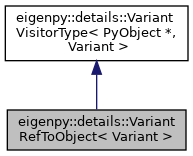#include <variant.hpp>
Inheritance diagram for eigenpy::details::VariantRefToObject< Variant >:

Public Types | |
| typedef VariantVisitorType< PyObject *, Variant > | Base |
| typedef Base::result_type | result_type |
| typedef Base::variant_type | variant_type |
Public Member Functions | |
| template<typename T , typename std::enable_if<!is_python_primitive_type< T >::value, bool >::type = true> | |
| result_type | operator() (T &t) const |
| template<typename T , typename std::enable_if< is_python_primitive_type< T >::value, bool >::type = true> | |
| result_type | operator() (T t) const |
Static Public Member Functions | |
| static result_type | convert (const variant_type &v) |
Detailed Description
template<typename Variant>
struct eigenpy::details::VariantRefToObject< Variant >
Convert {boost,std}::variant<class...> alternative reference to a Python object. This converter return the alternative reference. The code that create the reference holder is taken from
- See also
- bp::to_python_indirect.
Definition at line 214 of file variant.hpp.
Member Typedef Documentation
◆ Base
template<typename Variant >
| typedef VariantVisitorType<PyObject*, Variant> eigenpy::details::VariantRefToObject< Variant >::Base |
Definition at line 215 of file variant.hpp.
◆ result_type
template<typename Variant >
| typedef Base::result_type eigenpy::details::VariantRefToObject< Variant >::result_type |
Definition at line 216 of file variant.hpp.
◆ variant_type
template<typename Variant >
| typedef Base::variant_type eigenpy::details::VariantRefToObject< Variant >::variant_type |
Definition at line 217 of file variant.hpp.
Member Function Documentation
◆ convert()
template<typename Variant >
|
inlinestatic |
Definition at line 219 of file variant.hpp.
◆ operator()() [1/2]
template<typename Variant >
template<typename T , typename std::enable_if<!is_python_primitive_type< T >::value, bool >::type = true>
|
inline |
Definition at line 233 of file variant.hpp.
◆ operator()() [2/2]
template<typename Variant >
template<typename T , typename std::enable_if< is_python_primitive_type< T >::value, bool >::type = true>
|
inline |
Definition at line 226 of file variant.hpp.
The documentation for this struct was generated from the following file: